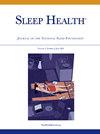Temporal changes in sleep parameters and body mass index after using a sleep-tracking app with gamification
IF 3.4
2区 医学
Q2 CLINICAL NEUROLOGY
引用次数: 0
Abstract
Objectives
We examined whether sleep parameters would improve with a sleep-tracking game app and whether the participants’ improvement was associated with changes in their body mass index.
Methods
We analyzed data from 2063 volunteer Japanese participants (mean age 38.3 ± 10.7 years, 82.1% female) who used both the Pokémon Sleep and Asken apps for ≥90 days.
Results
During the 90 days after starting the Pokémon Sleep app, on average, total sleep time increased by approximately 0.8 hour from 5.5 to 6.3 hours. Calculating the slopes for individuals, improvements were noted for total sleep time, sleep latency, percentage of wakefulness after sleep onset, and bedtime among 45.3%, 18.1%, 24.4%, and 21.3% of the participants, respectively. Body mass index tended to decrease faster in participants with improved total sleep time, sleep latency, and bedtime.
Conclusions
A sleep-tracking game app improved sleep parameters of some users, and this improvement was associated with a decrease in body mass index.
使用带有游戏化功能的睡眠追踪应用程序后,睡眠参数和体重指数的时间变化。
目的:我们研究了睡眠参数是否会通过睡眠跟踪游戏应用程序得到改善,以及参与者的改善是否与他们的体重指数变化有关。方法:我们分析了来自2063名日本志愿者(平均年龄38.3±10.7岁,82.1%为女性)的数据,这些参与者同时使用poksammon Sleep和Asken应用程序≥90天。结果:在启动poksammon Sleep应用程序后的90天内,平均总睡眠时间从5.5小时增加到6.3小时,增加了约0.8小时。计算个体的斜率,分别有45.3%、18.1%、24.4%和21.3%的参与者在总睡眠时间、睡眠潜伏期、睡眠后清醒百分比和就寝时间方面得到了改善。总的睡眠时间、睡眠潜伏期和就寝时间改善的参与者的体重指数往往下降得更快。结论:睡眠跟踪游戏应用程序改善了一些用户的睡眠参数,这种改善与体重指数的下降有关。
本文章由计算机程序翻译,如有差异,请以英文原文为准。
求助全文
约1分钟内获得全文
求助全文
来源期刊

Sleep Health
CLINICAL NEUROLOGY-
CiteScore
6.30
自引率
9.80%
发文量
114
审稿时长
54 days
期刊介绍:
Sleep Health Journal of the National Sleep Foundation is a multidisciplinary journal that explores sleep''s role in population health and elucidates the social science perspective on sleep and health. Aligned with the National Sleep Foundation''s global authoritative, evidence-based voice for sleep health, the journal serves as the foremost publication for manuscripts that advance the sleep health of all members of society.The scope of the journal extends across diverse sleep-related fields, including anthropology, education, health services research, human development, international health, law, mental health, nursing, nutrition, psychology, public health, public policy, fatigue management, transportation, social work, and sociology. The journal welcomes original research articles, review articles, brief reports, special articles, letters to the editor, editorials, and commentaries.
 求助内容:
求助内容: 应助结果提醒方式:
应助结果提醒方式:


